Understanding how to stop a dog chewing inappropriately is one of the most useful lessons you can learn.
While usually, this is a puppy problem and a habit most will naturally grow out of, it can also be a sign of anxiety or frustration in older dogs too.
So what can we do to help limit the damage that destructive chewing can cause?
The good news is that there are plenty of ways that this unfortunate, but often entirely natural habit can be effectively discouraged.
And if done right, it will provide a solid foundation to help with future obedience training.
For older dogs, when the causes are addressed you will end up with a much happier pet.
But before we look into the practical solutions which have the highest rates of success, you need to first understand the reasons why dogs decide to chew.
Want The Quick Solution? Discover The Easy Way To Instantly Stop Your Dogs Destructive Chewing Habits
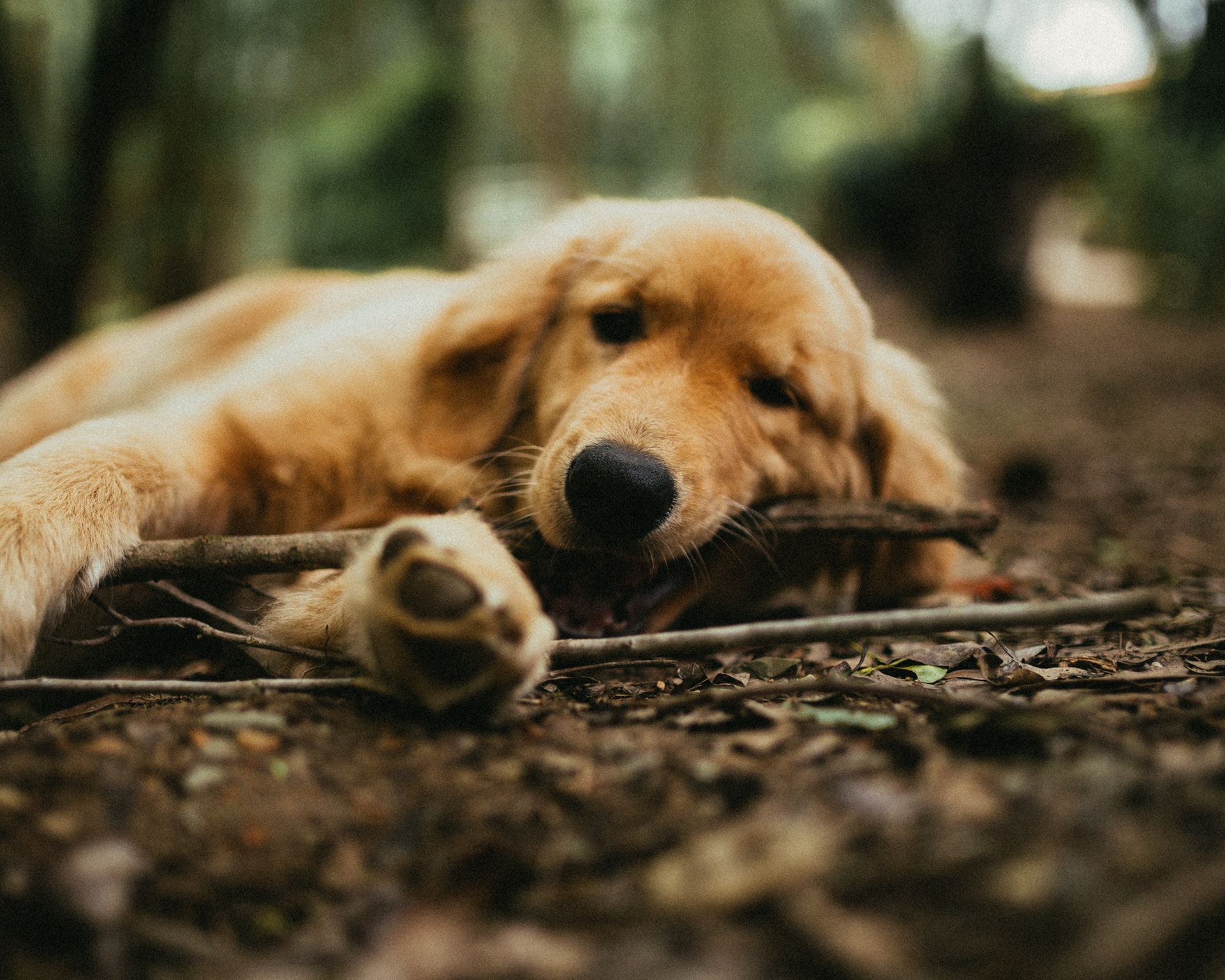
What Makes Dogs Chew?
Regardless of whether you keep a puppy or adult dog, establishing the reasons why they are chewing is an essential step towards establishing an appropriate course of action.
No matter what the age – or how valuable the item(s) they have decided to destroy – try to never lose your temper.
Of course, that is easier said than done when you open the front door to discover a gnawed pair of shoes, but don’t forget that your dog will be happy to see you come home.
To be met by shouting and arm waving can provoke seriously adverse reactions, making your dog more anxious and ultimately less likely to trust you.
So when this occurs, take a few deep breaths, greet your pup with a smile and set about understanding the issue.
Before listing the main reasons why dogs may engage in destructive chewing, you need to understand that it is natural for them.
Chewing is a means for dogs (especially puppies) to explore their environment and rarely done to establish whether or not something is edible.
And it’s why the #1 canine toy choice is not something to chase or fight (unlike cats!).
It’s something that is chewable.
As far as they are concerned, all they are doing is what is normal and instinctive behavior.
Which can be for any of the following reasons…
Want Expert Help? FREE Training Reveals The Easy Way To Stop Destructive Chewing
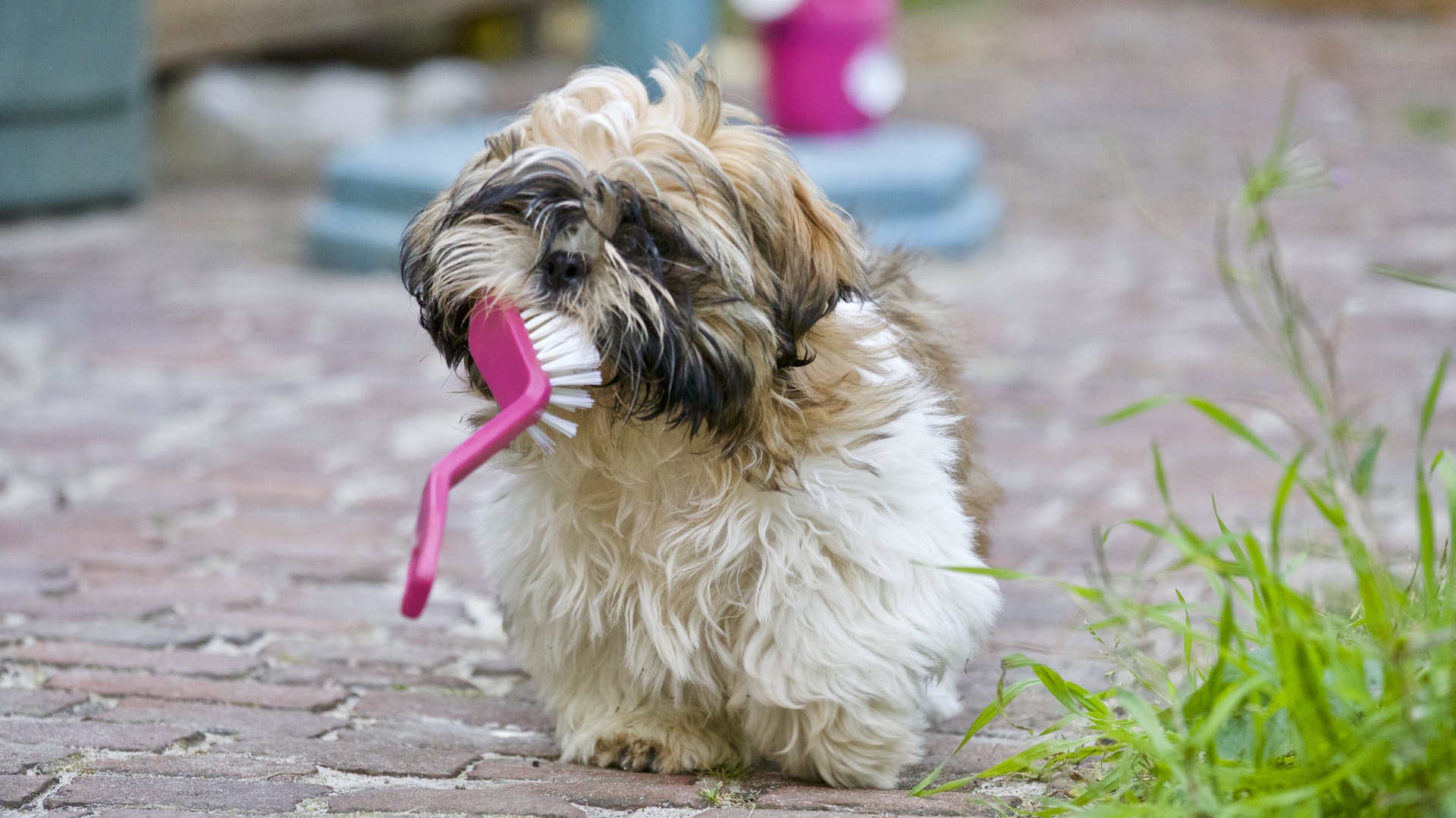
#1 – Puppy Teething
While inappropriate, chewing can manifest itself in all ages.
That’s why puppies between the ages of around three to eight months experience considerable discomfort in their gums.
To help make the teething process more bearable and speed up the development of adult teeth, puppies will quite happily chew away all day.
It makes absolutely no difference to them whether that is a proper toy or a valuable garment, upholstery or item.
And remember, never be cross at a puppy who gets their fangs into a valuable item – it is your fault for leaving it within their reach!
#2 – Separation Anxiety
Many owners who are out for long periods during the day will likely encounter this problem.
While usually considered to be more of a noise issue (constant barking, whining etc), it can also lead to destructive behavior.
From the dog’s perspective, they feel like they have lost or been abandoned by their pack (and source of food).
Now, this tends to affect older dogs more than anything, as they will have developed a full set of teeth and may start to gnaw on furniture, curtains, books – you name it.
So separation anxiety can be a serious issue and requires immediate attention and very rarely just vanishes on its own.
#3 – Boredom
Even dogs who can happily slumber away the day can start to develop an unpleasant chewing habit.
This may especially be the case should there be a sudden change of routine that requires them to be alone, indoors or unstimulated for longer than they are used to.
Breeds used to being very active and outdoors are particularly prone to this.
And while they may be otherwise disciplined and well behaved.
They are not very good at making their own fun or sleeping all day.
There’s a strong chance that sooner or later the boredom will get the better of them and they take to chewing away the hours instead.
#4 – Attention Seeking
Some dogs are more mischievous than others.
If they figure out that by chewing on a particular item makes their owner interact with them, even in a bad way then they will use it.
Often this habit develops when the dog feels understimulated due to a lack of exercise and/or playtime.
And it’s one of the reasons why taking your pet for regular walks is essential.
So if you’re happy to just let your dog hang out in the yard while paying little attention to them, you’re running a serious risk of this problem emerging.
#5 – Insufficient Diet
It is essential that dogs are fed an appropriate amount of good quality food measured out according to their weight.
Don’t forget to also account for their activity level, age and overall health either.
Should your dog become deficient in certain vitamins they may start to find them from inappropriate sources.
Calcium deficiency is perhaps the most common and is thought to explain why some dogs attack plaster and chew on stones/bricks.
If this happens make sure you consult a vet as they may be able to explain changes in your dog’s behavior.
Especially if you have recently changed food/diet.
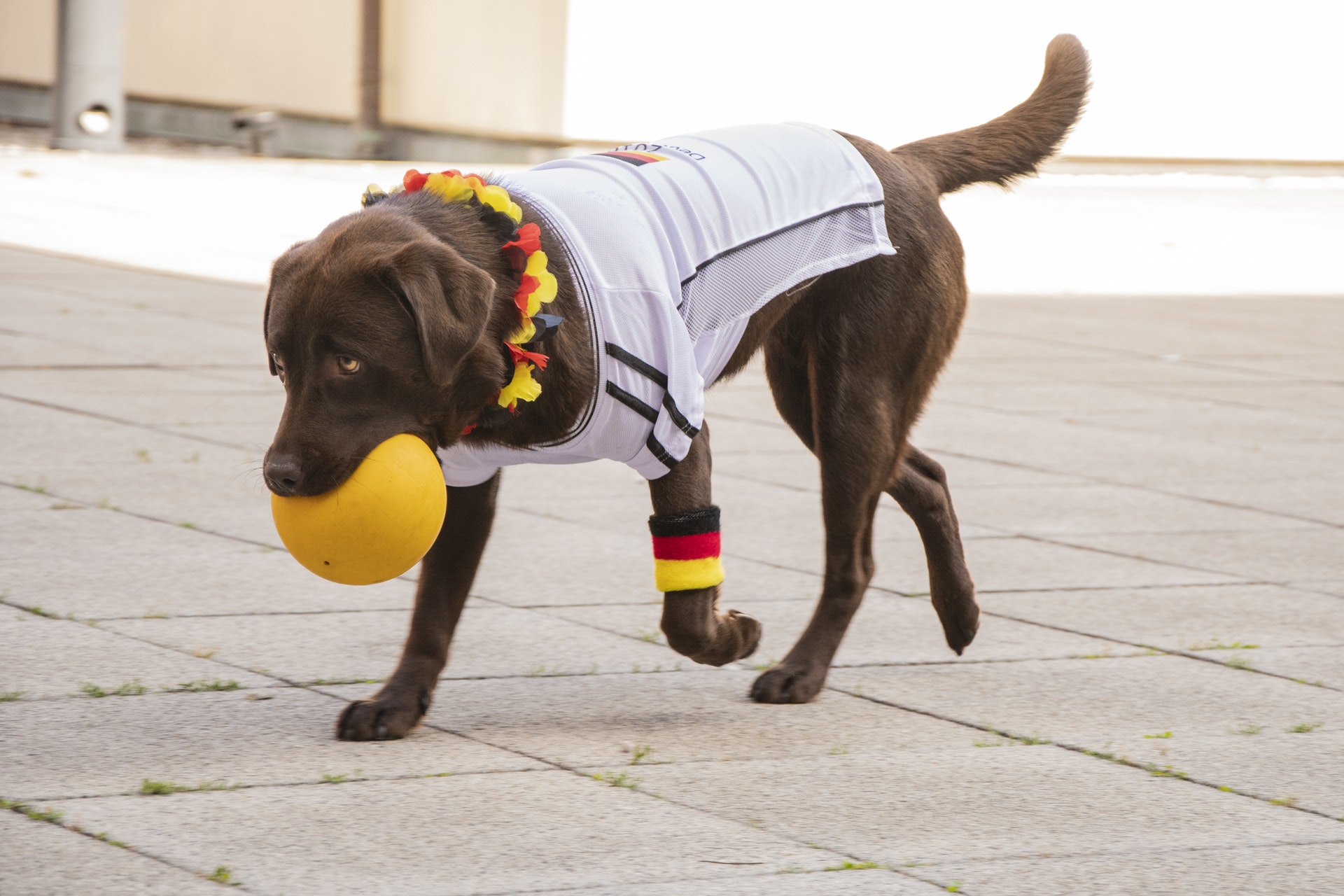
What Are The Effects Of Chewing?
Besides the obvious damage to expensive/valued household items, allowing a dog to continue with an inappropriate chewing habit can have seriously detrimental consequences for your relationship.
Negative punishments such as shouting or even smacking your dog will only serve to lessen their respect for you and your household rules.
And once your dog has decided they don’t like you, it can be damn near impossible to regain their trust.
Never forget that they are not aware that they are doing anything wrong, and if anything adopting a punitive approach will just encourage them to chew even more.
Inappropriate chewing can also be very dangerous for your dog.
Wood may splinter, stones may be swallowed, and many plastic household items contain toxins that are potentially lethal if ingested.
So it is your responsibility to ensure that anything valuable or dangerous to your dog is kept out of their reach.
That goes from irreplaceable family heirlooms to bottles of cleaning detergent.
During the puppy stage, it is especially important to isolate these kinds of items until the dog has learned to chew only on approved toys.
Related: How To Quickly & Easily Stop Destructive Chewing
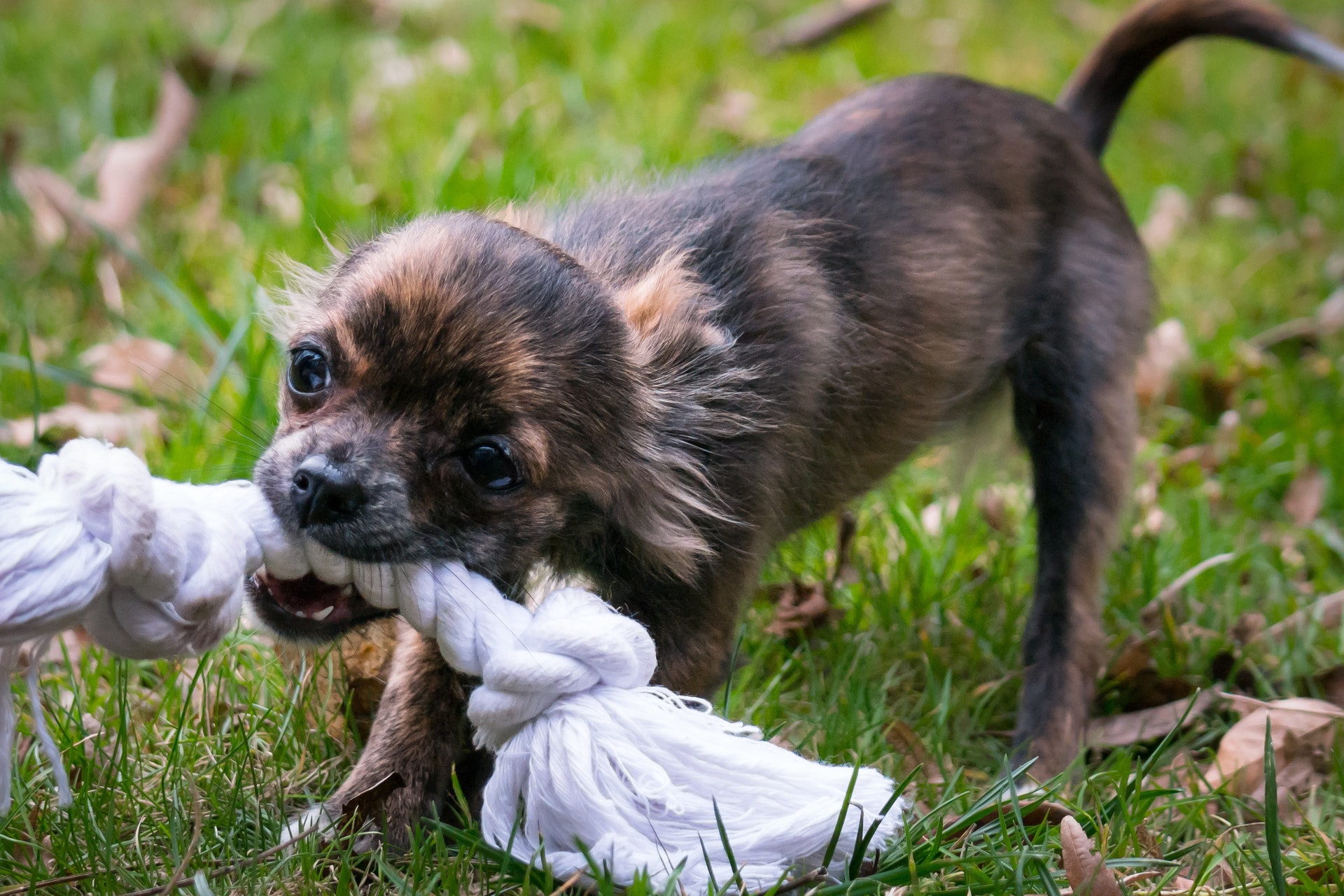
How To Stop Your Dog Chewing Everything In Sight
So now you understand the reasons and risks associated with chewing, let’s take a look at some of the best techniques to prevent the issue from becoming a serious problem.
And remember, in almost all cases the following advice will be useful providing you have identified and understand the reasons why your pooch is compelled to constantly nibble.
Puppies & Chewing
We’ll begin with puppies because they are almost always going to have an urge to chew and can also be the most difficult to control.
The first obvious step is to provide a variety of suitable chew toys.
Not only should these be constantly available for them to chew on, but they also serve as an instructional aid.
For example, should you discover your pup chewing something they shouldn’t (TV remotes are very popular…) then take it away and replace it with an approved toy.
They ought to pretty quickly get the message that certain items are absolutely out of bounds.
If you have a particularly boisterous puppy (or more than one) then it may be worth considering ‘puppy proofing’ your home.
Sure, it may seem a chore, but remember that it is only for a few months until they learn to control themselves better.
Remove anything that may present a choking risk, and stash along with everything of significant value in a ‘safe room’ and kept constantly out of bounds.
Positive Reinforcement Works!
If you happen to come home from work and find your dog happily chewing away on a toy then be sure to reinforce this behavior.
A treat, cuddle and quick play (tug of war is fun for both!) will make your dog feel great regardless of age.
It is a good idea to have a large selection of toys at hand and rotate them every couple of days.
In time, your dog will learn to recognize their different shapes and textures, making it even more clear what can be played with and what is out of bounds.
Try and add to the collection every so often and be sure to introduce new toys during playtime so that they know it is fair game.
And if you find your dog gazing at a prohibited item, then verbally tell them “no” in a calm yet controlled manner.
You can then go ahead and offer them their chewable toy instead and perhaps even a treat when they gnaw on that instead.
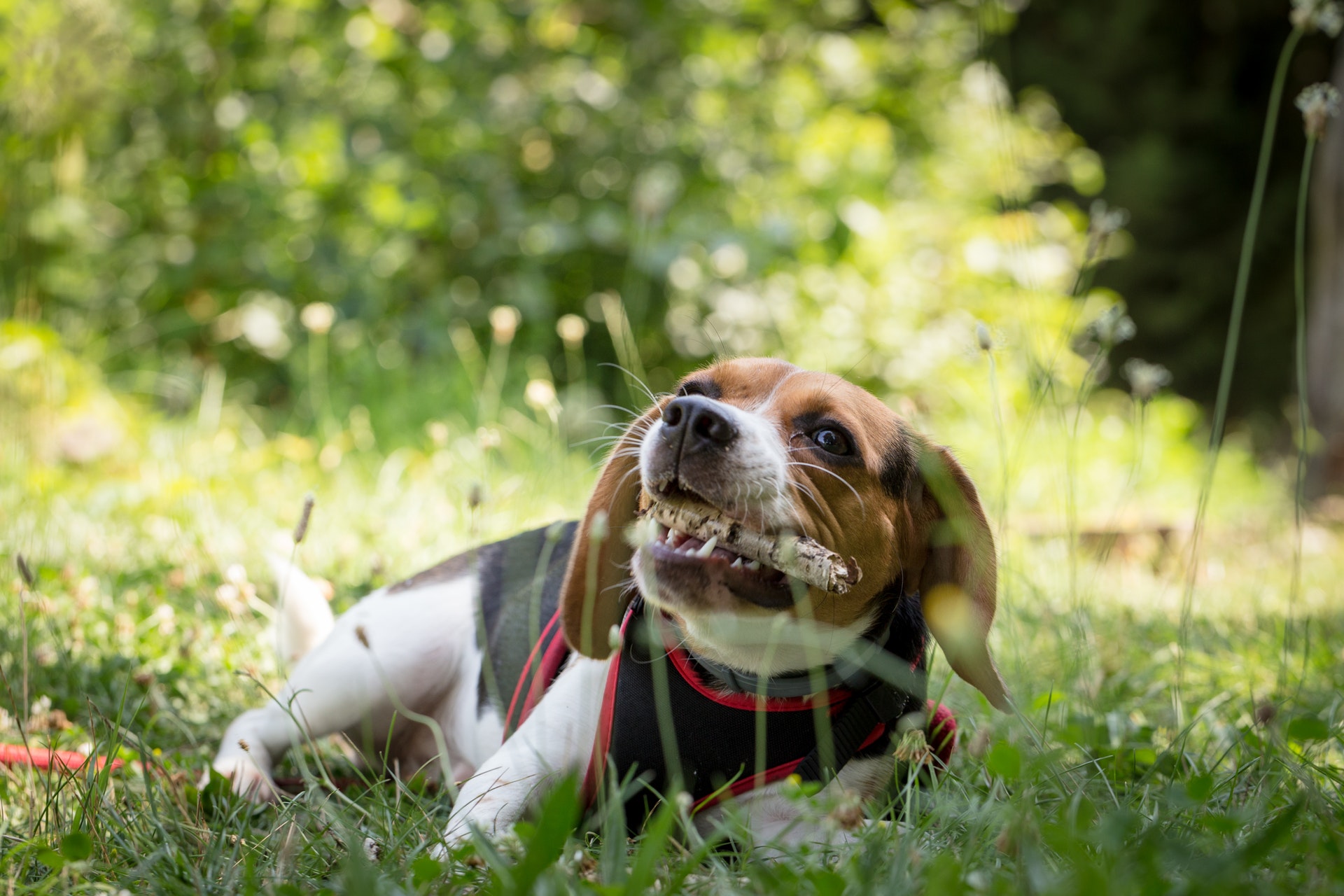
Chewing & Adult Dogs
When older dogs develop a chewing habit it can be extremely frustrating to try and understand why they have rescinded on their formerly good behavior.
Sometimes, if there is no obvious cause for why they have developed the issue, then a little ‘refresher’ phase on basic rules may be needed.
Try introducing some new chewable toys and remember to reinforce and reward good behavior.
And remember, losing your temper will never help. And in the case of attention seeking dogs, it will likely make the problem worse.
In the majority of cases, dogs develop chewing problems because they are stressed, anxious and/or bored.
If you think separation anxiety is the source of the problem you may need to consider relatively drastic options such as employing a dog walking service or even try professional Online Dog Coaching.
Relaxation aids such as a ThunderJacket are also with considering.
And while there is no guarantee that any of these will be the one and only solution, they can and do work providing you also do your best to help your dog be at ease when left alone.
You should also be aware that regular and extensive exercise is the best way to keep your dog stimulated and can go a long way towards resolving anxiety and depressive disorders.
By providing plenty of time to play with your dog is a great way to keep them invested in behaving well and enjoying their life.
Suitable Toys & Chews
There is a distinction between toys and chews that a surprising number of dog owners tend to forget.
Toys are intended to be picked up and stashed away after the end of playtime.
They are not intended for long term nibbling and will likely have a short lifespan otherwise.
Chews, on the other hand, tend to be for much longer periods of time both in your company and when the dog is left alone.
Making it clear that chews are for chewing instead of your precious furniture and belongings is the essential principle behind controlling this kind of behavior.
There are hundreds of varieties on the market but for long periods, consider picking up ‘puzzle’ chews where the dog nibbles and occasional treats may be found/released.
Good versions of these will not just keep your buddy occupied for hours but also last for years of intensive chewing!
Activity balls are another treat releasing option providing your home has enough floor space.
Final Thoughts
The vast majority of dogs can be steered towards appropriate chewing instead of destroying your personal belongings.
All it takes is a little time training and regular reinforcing alongside plenty of suitable alternatives to your shoes, TV remote or rug.
Mistakes will happen but it is important to never totally lose your cool.
Your dog will likely pick up on the slightest form of discontent and feel guilty for it.
So shouting and screaming, will just scare and confuse them.
And if none of that works and you feel ready to throw in the towel. I highly recommend you check out The Online Dog Trainer for more video training.
Like most aspects of coaching your dog towards good behavior, positive reinforcement and consistent engagement are the most important principles to never let slip.
Maintaining a fun and engaging routine will eliminate the majority of chewing issues in older dogs, while puppies… well, everyone has to learn sometime, right?
Do you have any more ideas on how to stop a dog chewing? Let me know in the comments below…